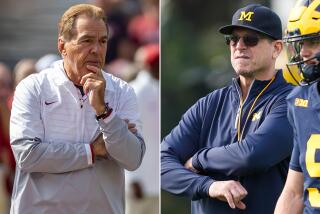TV AND THE GULF WAR : Silly and Solemn Share Equal Time on TV Dial
- Share via
A Sunday in TV’s combat zone.
Yes, from out of the desert it came, an awesome fighting machine invading a smaller, weaker foe. “The talk is over,” announced Pat O’Brien on CBS. The fighting was about to begin.
And, as expected, the No. 1-ranked UNLV Runnin’ Rebels destroyed the No. 2-ranked Arkansas Razorbacks in a basketball game telecast by CBS, as the sports and Persian Gulf wars proceeded on television simultaneously.
CBS Sports billed the UNLV-Arkansas clash as “The Big Game” in a way that rivaled “War in the Gulf.” Indeed, as different and distinct as they are, the sports and Gulf arenas of conflict are not entirely dissimilar these days.
In both realms, for example, there is a presumption of divine support. “In great conflicts, each party claims to act in accordance with the will of God,” Abraham Lincoln once said. At least one side must be wrong, Lincoln added, for “God cannot be for and against the same thing at the same time.”
Nonetheless, just as most Americans probably believe that God is a U.S. ally in the Persian Gulf conflict, so, too, did Iraqi President Saddam Hussein recently assure Peter Arnett on CNN that God favored the Iraqis. “So,” he asked, “how can we lose?”
Invoking the Almighty is also second nature to many sports figures, whether boxers thanking God for victory, as Terry Norris did Saturday night on cable’s Showtime after battering Sugar Ray Leonard, or the coach of the 1991 Super Bowl winner insisting on ABC afterward that this had not been just another football contest.
“God’s playing some of these games,” said New York Giants Coach Bill Parcells after his team beat the Buffalo Bills, “and he was on our side today.” On another day, of course, God could be on the Bills’ side, depending on the point spread.
Meanwhile, the Runnin’ Rebels themselves have been on the receiving end of what “CBS Sunday” contributor William Geist described as the NCAA’s “saturation bombing” of the basketball program as part of UNLV Coach Jerry Tarkanian’s long-running feud with that collegiate sports body.
Looking squarely at an interviewer Sunday in a way that recalled Hussein speaking of the Gulf War, Tarkanian predicted about his conflict with the NCAA: “It’s going to be a battle to the end.”
Whatever the warfare between Iraq and the U.S.-led coalition or between Tarkanian and the NCAA, it pales compared to the gory, snarly, no-prisoners-taken charade played out each week on that syndicated burlesque of the airwaves, “The McLaughlin Group.”
Host John McLaughlin is the despotic guru of these Washington-based preening press pundits who have yet to encounter a subject they can’t trivialize with their smirky, herky-jerky, petty bickering and grandstanding. They do everything but fire spitwads and stick out their tongues at each other.
Echoing TV’s infinite other droning war sages, the group’s inevitable guess-mongering Sunday centered on prospects for a land campaign in the Gulf War. Watching this on KNBC, your eyes stung, your nose ran and your throat constricted. Where was a gas mask when you really needed one?
“We should be chastened by now, because we haven’t been right on anything so far,” Jack Germond said. But why let that stop them?
“We’ve already done more bombing,” Eleanor Clift said.
“Oh, c’mon,” Fred Barnes said.
“Oh, c’mon,” Morton Kondracke said.
“Wait a minute,” Barnes said.
“All you anti-warriors,” Kondracke said.
“The emphasis is positive,” Clift said.
“It’s American lives,” Barnes said.
“What?” McLaughlin said.
“Just a second,” Barnes said.
“Look here,” McLaughlin said.
“But,” Kondracke said.
“But,” Barnes said.
“This is the way you do it,” Clift said.
“The way you do what?” Kondracke said.
“Let me make a point here,” Germond said.
“Let’s move on,” McLaughlin said.
Poor babies, they were exhausted. Having fun with war is hell.
More to Read
Go beyond the scoreboard
Get the latest on L.A.'s teams in the daily Sports Report newsletter.
You may occasionally receive promotional content from the Los Angeles Times.










